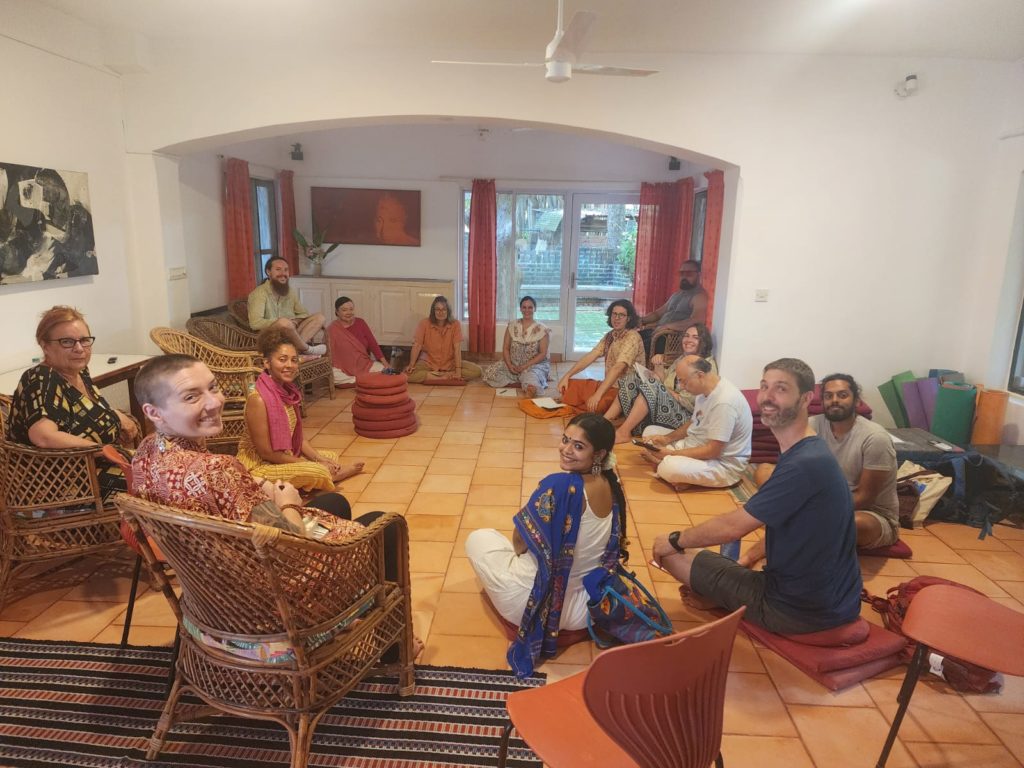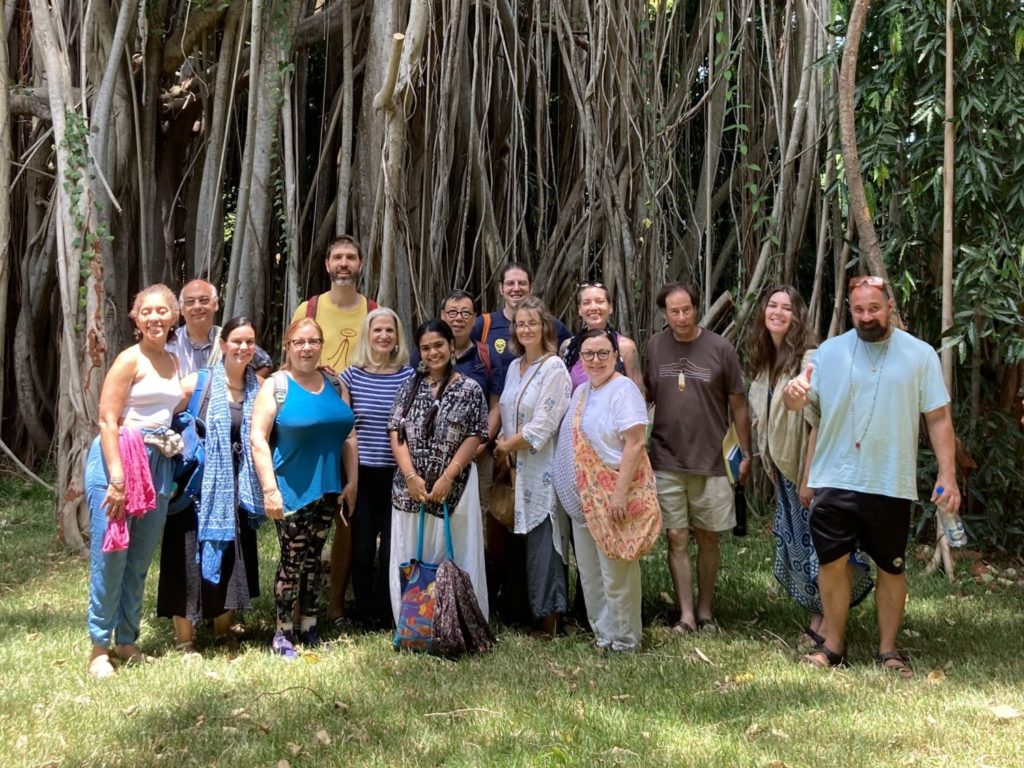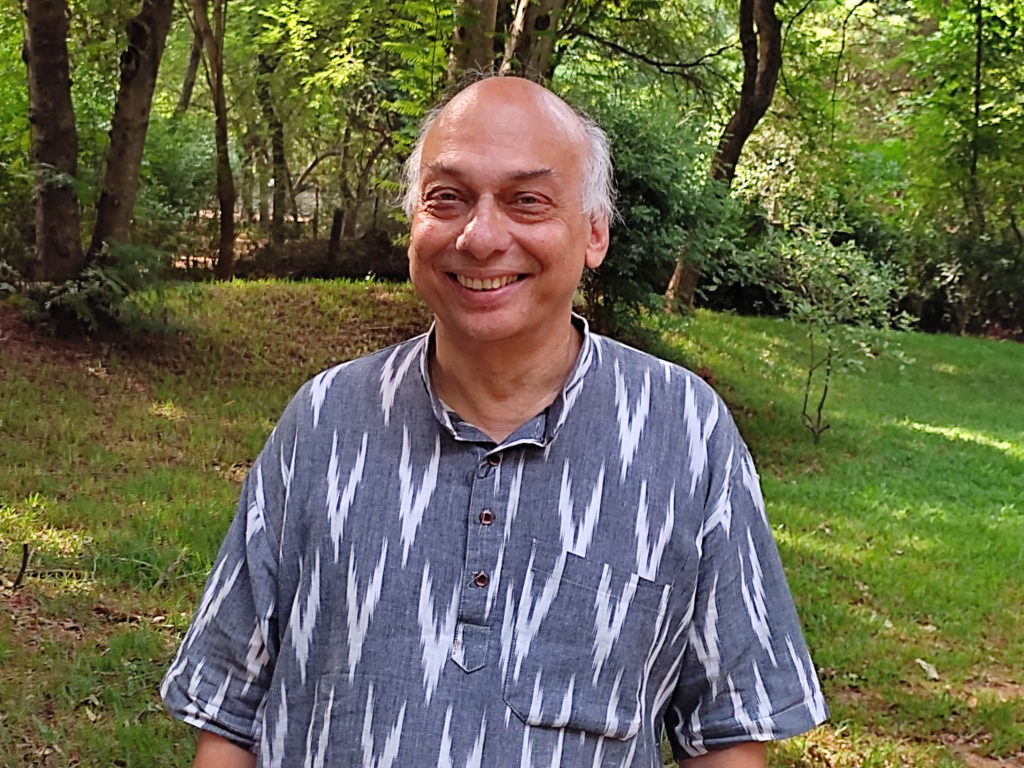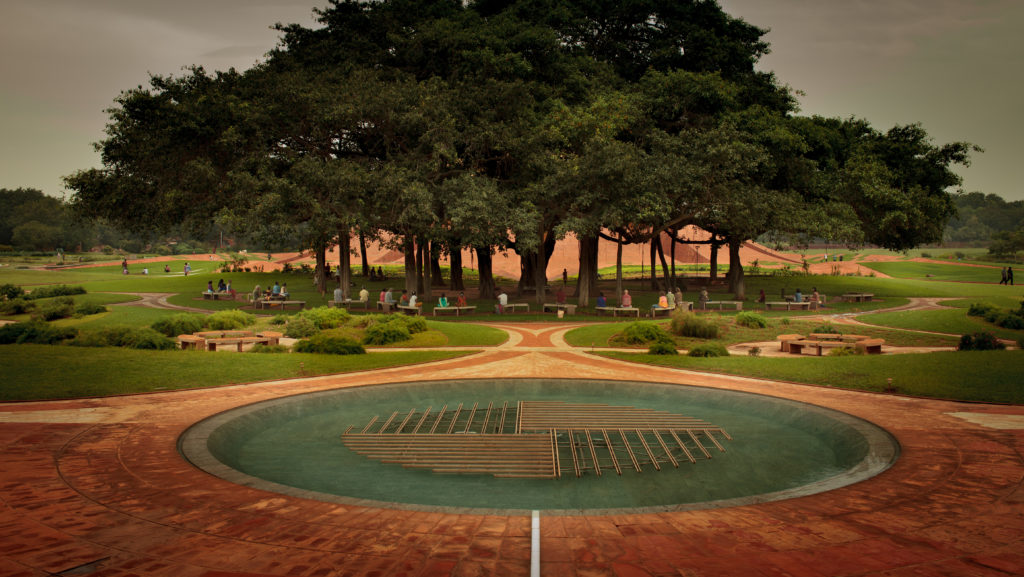An external perspective on the present crisis
Dr. Debashish Banerji is the Haridas Chaudhuri Professor of Indian Philosophies and Cultures and the Doshi Professor of Asian Art at the California Institute of Integral Studies (CIIS), San Francisco, where he also chairs the Department of East-West Psychology. In August 2023, he visited Auroville with a group of CIIS students and speaks in this interview about his own and their perceptions after several weeks in Auroville and at the Ashram.
“I think the students got a good view of the present situation that is informed by facts. Most Aurovilians they spoke to felt they had come here to realise an ideal, but that their work of many years was in jeopardy because of external forces impinging on their lives.
The conditions for ‘divine anarchy’
The students felt that the core issue is ownership. Many of the people who came to Auroville in the 1960s were products of the counterculture and were looking for a new kind of life. The Mother appealed to this sense. She said that the existing world is based on wrong foundations and those who come to Auroville should have an aspiration for a new kind of life. Connected with this is what the Mother calls ‘divine anarchy’ and Sri Aurobindo calls ‘spiritual anarchism’ in his social and political texts. It involves an aspiration for a grassroots sense of oneness that has no need of ownership or governance from the top.
That’s the aspiration with which the Mother created Auroville as a social experiment in human unity founded on her and Sri Aurobindo’s vision for a future civilisation. Of course, others have had such a vision, for example Marx dreamed of a future of collective self-governance but these thinkers lacked the psychological knowledge for its achievement. The Mother based this social objective on the development of a consciousness of unity and harmony through yogic praxis. That’s why the very first article in the Charter of Auroville says that Auroville belongs to nobody in particular, it belongs to humanity as a whole. In other words, it was not intended to be a place that is ‘owned’ by any institution, individual or group, but rather a place which would provide the freedom for a collective growth of consciousness that develops the conditions for divine anarchy.

The problem of ‘ownership’
However, the Mother was very conscious that the world was not ready for this, that there are legal realities which could not be ignored, so for practical purposes, such as buying land, she arranged for the Sri Aurobindo Society to legally own Auroville, although this ownership was meant to be only in name. But the will to own and control Auroville proved too strong, and the Government of India had to step in, so to say, to protect the Mother’s dream.
When the ownership of Auroville shifted, the feeling was that the government would be like a benevolent Big Brother which would keep Mother’s dream alive and allow the Aurovilians to develop in the way that they needed to achieve this, while, at the same time, ensuring that no others would claim ownership. For many years, this seemed to be the case.
But we now see a government that has a strong sense of ownership of the cultural identity of India, and, seemingly, also wishes to shape Auroville according to this identity.
Politically, the Auroville Foundation Act of 1988, framed at the conclusion of the conflict of the 70s, seemed to provide a governing structure that empowered the residents of Auroville, but with the current administration’s interpretation, the Residents’ Assembly has been sidelined in favour of government-appointed persons. This clash of approaches to ownership seems to be at the core of what’s happening now. It is a return to a struggle for ownership over a community which has been envisioned to have no ownership.
And ownership of Auroville has suddenly become very attractive. Not only from the viewpoint of consumption with its world cuisine or products and services of the New Age world market, but also Auroville is beginning to look like an experiment that is offering solutions to larger world problems. From this point of view it is a bud ready to bloom, both materially and culturally, offering an attractive prospect for ownership leading to material and ideological exploitation.

Polarising rhetoric
Around this central issue of ownership, there are other oppositions that complicate the polarisation. For example, postcolonial insecurities. You hear this rhetoric repeatedly, that these Westerners are culturally blind towards India, are arrogant and insulting towards its culture.
There are those who claim to know exactly what the Mother wanted for Auroville, quoting texts that they weaponise like commandments. Several of these arguments owe their genesis to the conflict of the 70s that remained unresolved and have re-emerged to group themselves around the central problem of national ownership and identity politics.
Emerging answers?
Regarding alternative futures, the students see Auroville as fulfilling its purpose by becoming a model town that can solve the problems of humanity through its power of consciousness, for this could be the seed of something that is replicable. Some feel this possibility could only be protected by the kind of federated world union Sri Aurobindo envisaged. But that is a seemingly impractical dream today; the hope for a world union or even a world conscience has never seemed more distant.
Otherwise, they are looking for the answers emerging from Aurovilians themselves. One of these is dependence on the courts. In our times, many hold the judiciary as the last incorruptible institution that may vindicate humanism. We see this here too. Despite recent legal setbacks, a number of people in Auroville are hoping that the judiciary will prove to be its saviour.
Another view they heard repeatedly is the need for faith in the Mother. I think the level of helplessness is very great at present – that’s the most tragic aspect of the present situation – but people who were here in the 1970s when Auroville was threatened by the Sri Aurobindo Society felt that Mother acted and saved Auroville then, even though she was no longer in her body, and she will do so again.

The need for a new language
Many of the students, as well as myself, feel that Aurovilians have not developed the ability to express why they are here, what the place is about, and why it is important to the world. This can’t be done by simply repeating the words of the Mother and Sri Aurobindo because that turns it into a mere personality cult and a religion. It has to be done from personal experience through creative expressions of clarity and conviction in various circumstances and to various audiences here and now.
Although many people feel powerless, I believe one has to stand up against the forces which threaten Mother’s vision of freedom in Auroville, and find those avenues of power which one can utilise. But to do this while understanding the gravity and complexity of the situation. One is up against an antagonist who seems too big and powerful, a Goliath.
I feel there is a need for a new language to validate as widely as possible the reality of Auroville, and why the Mother has created it. It’s very important that more people in the world understand this at this moment both inside and outside Auroville, starting with Aurovilians themselves.”
Extracted from Voice of Auroville, Issue 04, November 2023
Abridged from Auroville Today Issue 410, September 2023

